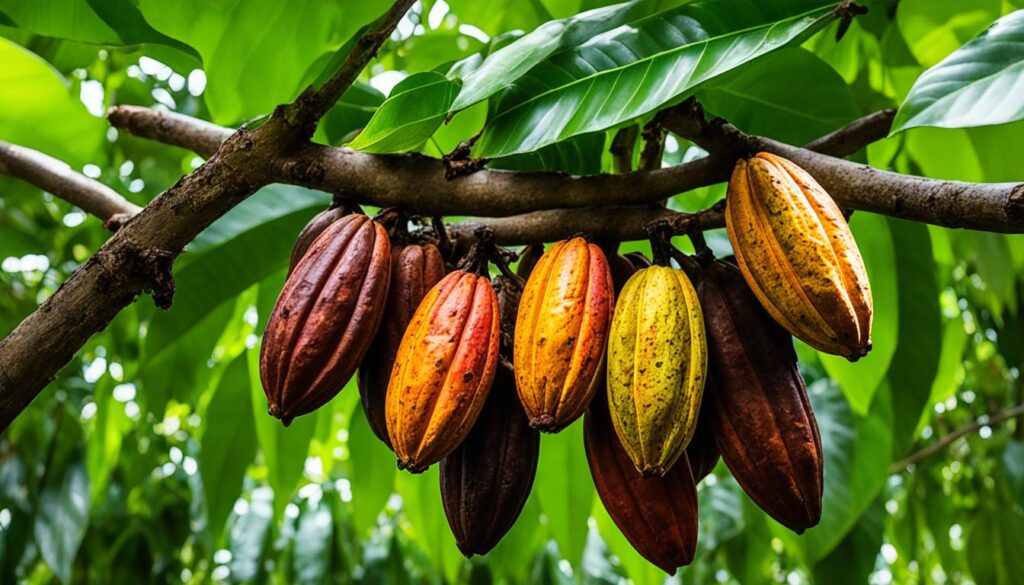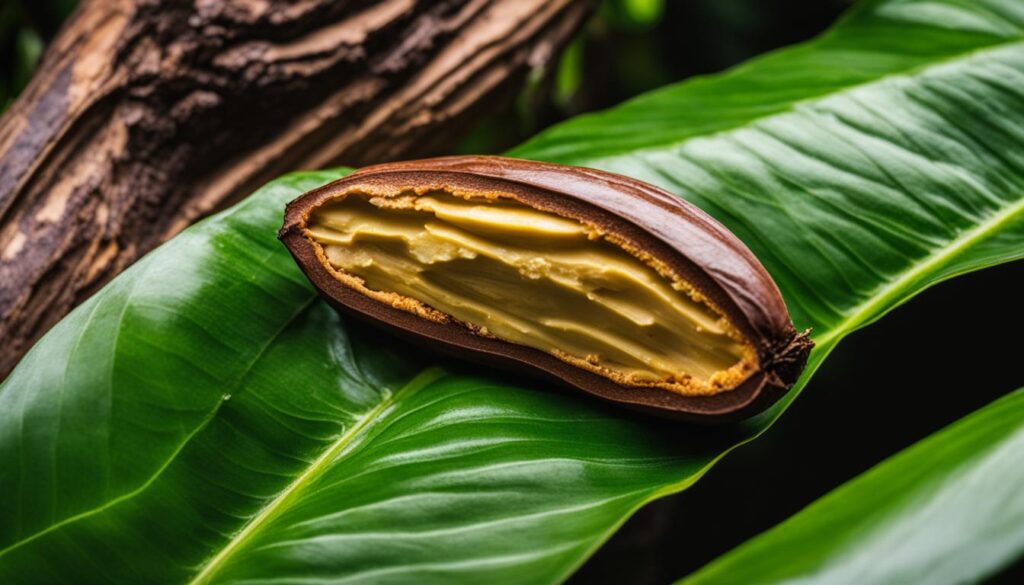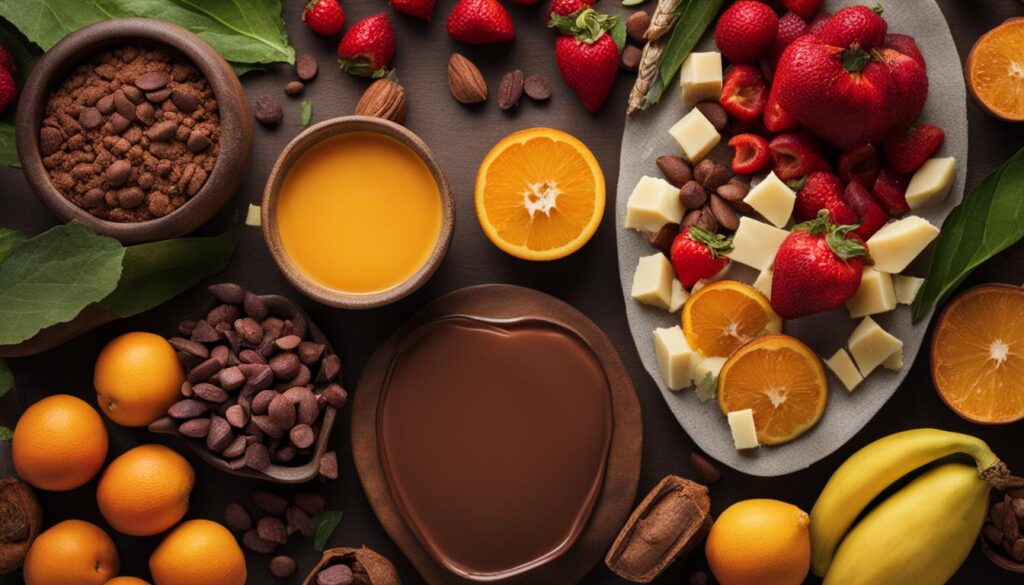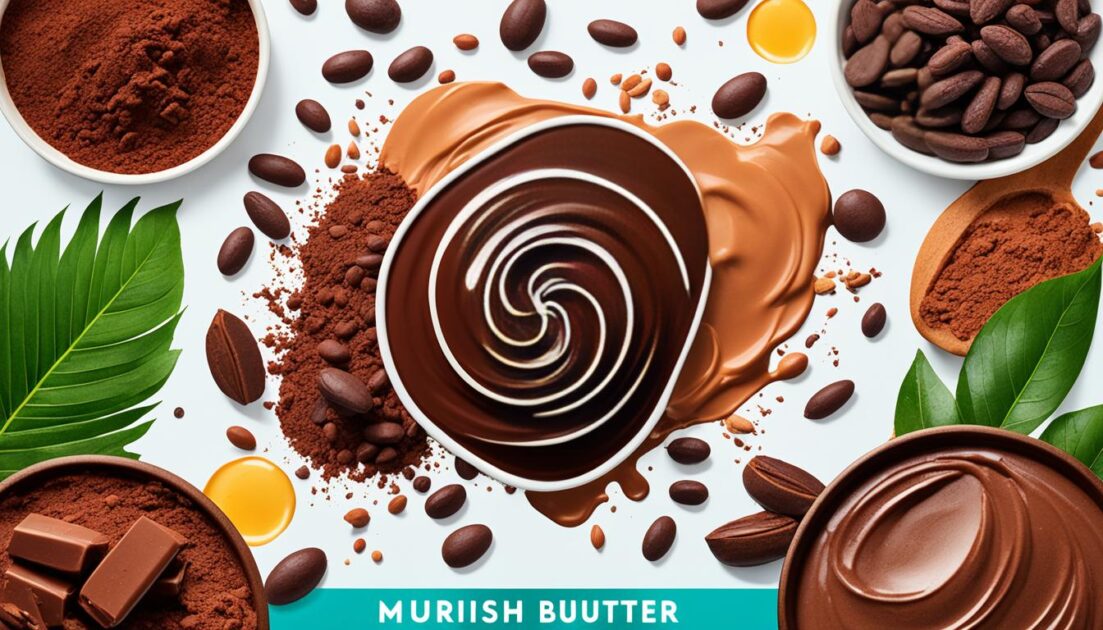Welcome to my blog where I explore the various benefits and uses of cocoa butter. As a versatile ingredient derived from cocoa beans, cocoa butter offers a range of advantages for both our health and beauty. From skincare to cooking, this natural fat has gained popularity for its numerous applications. Let’s dive into the world of cocoa butter and discover why it is considered so healthy.
Key Takeaways:
- Cocoa butter is a light-yellow vegetable fat derived from cocoa beans.
- It contains heart-healthy oleic acid, essential vitamins like vitamin E, and offers numerous benefits for the skin, cholesterol levels, and bone health.
- Cocoa butter is vegan-friendly and widely used in chocolates, skincare products, and cooking.
- Its versatility allows for uses in moisturizers, lip balms, desserts, and even as a substitute for oil in cooking.
- In moderation, cocoa butter can contribute to overall well-being and provide holistic health and beauty benefits.
What is Cocoa Butter?
Cocoa butter, also known as theobroma oil, is a type of fat extracted from cocoa beans. It is a valuable raw material used in the production of chocolates, cosmetics, and pharmaceuticals. Cocoa butter can be found in various products, including milk, dark, and white chocolate, as well as gianduja chocolate, cakes, cookies, ice cream, and popular beverages like lattes and hot chocolate.
The process of obtaining cocoa butter involves several stages, starting with the cleaning and shelling of cocoa beans. After that, the beans undergo fermentation, which helps enhance the butter’s stability during the manufacturing process and contributes to its aroma. Finally, the cocoa butter is extracted, ready to be utilized in various industries.
How is Cocoa Butter Made?
Cocoa butter production involves several key steps, starting from cocoa beans and culminating in the extraction of the precious butter.
Cocoa beans, which are the primary raw material for cocoa butter, contain approximately 40-50% fat. These beans undergo a meticulous process that includes cleaning, shelling, and optional fermentation to produce cocoa butter. Fermentation is particularly crucial as it helps maintain the stability of cocoa butter during manufacturing while enhancing its aroma.
After the fermentation process, the beans are further processed into cocoa nibs and cocoa liquor. The cocoa liquor undergoes pressing, a vital step that extracts the cocoa butter. This extracted cocoa butter is then utilized in the production of various chocolaty delights, imparting rich flavor and luxurious texture. Additionally, cocoa cake and cocoa powder are other end products that stem from cocoa processing, providing versatility and diverse consumption options.
To summarize, cocoa butter production involves the meticulous cleaning and shelling of cocoa beans, followed by optional fermentation that enhances the stability and aroma of the butter. The beans are further processed into cocoa nibs and liquor, with the cocoa liquor being pressed to obtain the coveted cocoa butter.
Cocoa Butter Production Process
Below is a step-by-step guide illustrating the cocoa butter production process:
| Steps | Description |
|---|---|
| Cleaning | Cocoa beans are carefully cleaned, removing any impurities or foreign materials. |
| Shelling | The outer shell of the cocoa beans is removed, revealing the cocoa nibs. |
| Fermentation (optional) | The cocoa nibs can be fermented to enhance the stability and aroma of the cocoa butter. |
| Processing | The beans are further processed into cocoa nibs and cocoa liquor. |
| Pressing | The cocoa liquor goes through a pressing process, extracting the cocoa butter. |

Through these carefully crafted steps, cocoa butter is produced, offering its exquisite flavor and various health and beauty benefits.
Nutrients in Cocoa Butter
Cocoa butter is not only delicious but also packed with essential nutrients that contribute to its potential health benefits. Let’s explore the various nutrients found in cocoa butter:
Polyphenols
Cocoa butter contains polyphenols, which are plant compounds known for their antioxidant properties. These antioxidants help protect the body against oxidative stress and reduce the risk of chronic diseases.
Fatty Acids
The fatty acid profile of cocoa butter includes both saturated and monounsaturated fats. Saturated fats like stearic acid and palmitic acid are known to have a neutral effect on cholesterol levels, while monounsaturated fats like oleic acid are beneficial for heart health.
Vitamin D2
Cocoa butter is a natural source of vitamin D2, which plays a crucial role in bone health, immune function, and overall well-being.
Minerals
In addition to polyphenols and fatty acids, cocoa butter contains essential minerals such as potassium, phosphorus, copper, iron, zinc, and magnesium. These minerals support various bodily functions and contribute to overall health and vitality.
To increase the polyphenol content in cocoa butter, cocoa powder can be added to chocolate products. Now, let’s take a look at a table summarizing the nutritional composition of cocoa butter:
| Nutrient | Amount per 100g |
|---|---|
| Polyphenols | XX mg |
| Fatty Acids |
Stearic Acid: XX g Palmitic Acid: XX g Oleic Acid: XX g |
| Vitamin D2 | XX IU |
| Minerals |
Potassium: XX mg Phosphorus: XX mg Copper: XX mg Iron: XX mg Zinc: XX mg Magnesium: XX mg |
The nutrient composition of cocoa butter makes it a valuable addition to a healthy and balanced diet. Incorporating cocoa butter in moderation can provide you with these essential nutrients and contribute to your overall well-being.
Health Benefits of Cocoa Butter
Cocoa butter, derived from cocoa beans, offers a range of health benefits that contribute to overall well-being. It is a natural source of vitamin D, which plays a crucial role in supporting bone health, strengthening the immune system, and promoting heart health.
The polyphenols found in cocoa butter have been found to have positive effects on heart health. These powerful antioxidants help reduce blood pressure and improve blood vessel function, leading to a healthier cardiovascular system. Regular consumption of cocoa butter may help reduce the risk of heart disease.
“The flavonoids in cocoa butter have been shown to enhance blood vessel health, improve blood flow, and reduce the risk of heart disease.” – Dr. Stephanie Johnson
In addition to its heart-healthy properties, cocoa butter consumption has also been linked to improved insulin resistance. Insulin resistance is a metabolic condition that can lead to diabetes and other health complications. By incorporating cocoa butter into your diet, you may be able to manage insulin resistance effectively.
To highlight the specific health benefits of cocoa butter:
- Good source of vitamin D, supporting bone health, immunity, and heart health
- High in polyphenols, which reduce blood pressure and enhance blood vessel health
- Aids in improving insulin resistance and managing diabetes risk
It’s important to note that while cocoa butter offers these health benefits, it should be consumed in moderation due to its calorie content. Incorporating cocoa butter into a balanced diet alongside regular physical activity can promote a healthy lifestyle and contribute to overall well-being.
| Health Benefit | Description |
|---|---|
| Vitamin D Source | Supports bone health, immunity, and heart health |
| Promotes Heart Health | Reduces blood pressure and enhances blood vessel function |
| Improves Insulin Resistance | Helps manage diabetes risk and regulate blood sugar levels |
Downsides of Cocoa Butter
While cocoa butter is generally considered safe to use and offers numerous benefits, it’s important to be aware of its potential downsides. It’s essential to consume cocoa butter in moderation due to its high calorie content and saturated fat content. Excessive consumption of cocoa butter can contribute to weight gain and increase the risk of cardiovascular diseases.
Another potential downside of cocoa butter is its potential to cause acne breakouts in some individuals. The comedogenic properties of cocoa butter can clog pores and lead to the formation of pimples and blackheads, especially in individuals with oily and acne-prone skin.
Furthermore, cocoa butter may potentially lower estrogen levels in women. While research on this topic is limited, it is advisable for women with hormone-related conditions or those who are pregnant or breastfeeding to consult with a healthcare professional before using cocoa butter topically or consuming it in large quantities.
Additionally, it’s important to note that some dark chocolate and cocoa powder products may contain traces of harmful metals like cadmium and lead. These metals can be present in cocoa beans due to environmental factors. As a precaution, it is recommended to choose high-quality, reputable brands that prioritize rigorous testing and quality control.
To address these concerns and reduce the cost of cocoa products, the food industry has developed cocoa butter equivalents. These equivalents are used as substitutes for cocoa butter in some food products. While they aim to provide cost-effective alternatives, it’s important to note that cocoa butter equivalents may differ in taste and overall quality compared to natural cocoa butter.
Uses of Cocoa Butter in Cooking and Skincare
Cocoa butter is a versatile ingredient that can be used in various ways. Its unique properties make it suitable for both cooking and skincare purposes. Let’s explore the different uses of cocoa butter in these two domains.
In Cooking
Cocoa butter is commonly used in the creation of chocolates and desserts. Its rich flavor and smooth texture enhance the taste and consistency of these treats. Here are some ways you can incorporate cocoa butter into your cooking:
- Making Chocolate: Cocoa butter is a key ingredient in chocolate production. It provides the desirable melt-in-your-mouth experience and contributes to the overall taste and texture of the chocolate.
- Substitute for Oil: You can use cocoa butter as a substitute for oil in recipes. It adds a unique chocolatey flavor and richness to both sweet and savory dishes.
- Delicious Desserts: Cocoa butter can be used in a variety of desserts such as cookies, cakes, and brownies. Its high smoke point makes it ideal for high-temperature baking, ensuring a perfect texture and flavor.
In Skincare
Cocoa butter is a popular ingredient in skincare products due to its moisturizing and healing properties. Here are some ways cocoa butter can benefit your skin:
- Moisturization: Cocoa butter is a natural emollient that helps hydrate and nourish the skin. It locks in moisture, leaving your skin soft and supple.
- Soothing Burns and Rashes: The healing properties of cocoa butter make it effective in soothing burns, rashes, and other skin irritations. Its gentle nature helps to alleviate discomfort and promote healing.
- Homemade Lip Balms: You can create your own lip balms using cocoa butter. Its hydrating properties help to keep your lips moisturized and prevent chapping.
Whether you’re cooking up delicious treats or taking care of your skin, cocoa butter is a versatile and beneficial ingredient. Its uses in both cooking and skincare highlight its multifaceted nature and its ability to enhance various aspects of our lives.

Cocoa Butter for Anti-Aging and Skincare
Cocoa butter is renowned for its skincare benefits. It is a natural emollient that helps moisturize and hydrate the skin. The high antioxidant content in cocoa butter fights free radicals and helps reduce signs of aging, such as wrinkles and skin dullness. It also improves skin elasticity, tone, and hydration. Cocoa butter is commonly used to prevent and treat stretch marks, soothe sensitive skin conditions like dermatitis, and protect against dry and cracked lips. Its nourishing properties make it a popular choice for natural skincare routines.
“Cocoa butter is a true miracle for the skin. Its moisturizing properties and anti-aging benefits make it an excellent addition to any skincare routine.” – Dr. Emily Collins, Dermatologist
The Role of Antioxidants in Skincare
Antioxidants are key players in skincare as they help protect the skin from damage caused by free radicals, which are unstable molecules that can contribute to aging and other skin concerns. Cocoa butter is rich in antioxidants, such as polyphenols, which help neutralize free radicals and promote a youthful complexion.
The Benefits of Cocoa Butter for Aging Skin
As we age, our skin tends to become drier and loses its elasticity. Cocoa butter’s moisturizing properties help replenish lost moisture and maintain skin hydration. Its emollient nature creates a protective barrier on the skin, preventing moisture loss and keeping the skin soft and supple.
- Cocoa butter improves skin elasticity, reducing the appearance of fine lines and wrinkles.
- It enhances skin tone, leaving the skin looking brighter and more radiant.
- Cocoa butter helps fade scars and marks, including stretch marks, improving the overall texture of the skin.
Natural Skincare with Cocoa Butter
Cocoa butter is a popular ingredient in natural and organic skincare products due to its mild and gentle nature. Its moisturizing properties make it suitable for all skin types, including sensitive skin. Whether used in body creams, lotions, lip balms, or massage oils, cocoa butter provides deep hydration without clogging pores.
Homemade Cocoa Butter Recipes
You can incorporate cocoa butter into your skincare routine by making simple DIY recipes at home. Here are a few ideas:
- Create a cocoa butter lip balm by melting cocoa butter with beeswax and adding a few drops of your favorite essential oil.
- Mix cocoa butter with coconut oil and shea butter for a luxurious body butter that nourishes and soothes the skin.
- Add cocoa butter to your favorite homemade face mask recipe for added hydration and rejuvenation.
Experiment with different recipes and find what works best for your skin’s needs. Remember to patch test any new product or recipe before applying it to your entire face or body.
Cocoa Butter for Immunity and Heart Health
When it comes to promoting overall health and well-being, cocoa butter has more to offer than just its delightful taste and moisturizing properties. The plant polyphenols found in cocoa butter possess remarkable antioxidant properties, making it a valuable addition to support your immunity and heart health.
The antioxidant properties of cocoa butter help combat inflammation and protect against cellular damage. By reducing oxidative stress, cocoa butter supports the immune system, helping to lower the risk of chronic diseases and promoting a healthy body.
But cocoa butter’s benefits don’t stop there. Its anti-inflammatory properties also play a crucial role in maintaining heart health. Inflammation in the body can lead to conditions like atherosclerosis, a buildup of plaque in the arteries. Cocoa butter aids in lowering inflammatory markers associated with these conditions, while also promoting healthy lipid metabolism.
With its unique blend of anti-inflammatory and antioxidant properties, cocoa butter can contribute to your overall well-being. Whether in your favorite chocolate treats or skincare routine, incorporating cocoa butter can help boost immunity and support a healthy heart.

How Cocoa Butter Helps Improve Mood
Cocoa butter has been found to have mood-boosting effects, thanks to its ability to increase the levels of dopamine and serotonin in the brain. These neurotransmitters are closely associated with feelings of pleasure, happiness, and calmness. Consuming or applying cocoa butter can help reduce anxiety and induce a sense of calm, promoting overall well-being.
When we experience periods of stress or hormonal fluctuations, it is not uncommon to crave chocolate, which contains cocoa butter. This craving is our body’s way of seeking comfort and relief, as cocoa butter’s properties can provide a soothing and uplifting effect on our mood.
While the exact mechanisms behind cocoa butter’s mood-enhancing capabilities are still being studied, its impact on dopamine and serotonin levels is significant. By increasing these neurotransmitters, cocoa butter helps to regulate mood, improve emotional well-being, and alleviate symptoms of anxiety and stress. These effects contribute to the overall positive impact cocoa butter can have on our mood and mental state.
Cocoa Butter and Heart-Healthy Fats
Contrary to previous beliefs, plant-derived saturated fats like cocoa butter are now recognized as beneficial for heart health. The polyphenols in cocoa butter help lower inflammatory markers involved in conditions like atherosclerosis. Cocoa butter’s saturated fats are stable and resilient against spoilage, making it a suitable option for healthy fats in the diet. Consuming cocoa butter in moderation can contribute to a reduced risk of cardiovascular diseases and promote overall heart health.
Benefits of Cocoa Butter for Cardiovascular Health
One of the main concerns surrounding saturated fats is their impact on cardiovascular health. However, recent studies have revealed that not all saturated fats are created equal. While some saturated fats like those found in high-fat dairy and red meat may increase the risk of heart disease, plant-derived saturated fats like cocoa butter have shown potential benefits.
Cocoa butter contains a unique combination of fatty acids, including stearic acid, palmitic acid, and oleic acid. While stearic and palmitic acid are considered saturated fats, they have different effects on cholesterol levels compared to animal-derived saturated fats. Studies have demonstrated that stearic acid, which makes up a significant portion of cocoa butter, does not raise LDL (bad) cholesterol levels as much as other saturated fats do. Furthermore, oleic acid, which is also found in cocoa butter, is a monounsaturated fat known for its cardiovascular benefits.
The polyphenols present in cocoa butter also play a crucial role in cardiovascular health. These natural compounds have antioxidant and anti-inflammatory properties, which contribute to the reduction of inflammation, oxidative stress, and the formation of plaque in the arteries.
“The polyphenols found in cocoa butter have been shown to lower blood pressure, improve blood vessel health, and reduce the risk of developing atherosclerosis.”
Additionally, cocoa butter’s stability and resistance to spoilage make it a reliable option for incorporating healthy fats into the diet. Unlike other fats that can become rancid over time, cocoa butter maintains its quality and nutritional properties, ensuring long-lasting benefits for cardiovascular health.
The Role of Cocoa Butter in a Heart-Healthy Lifestyle
Integrating cocoa butter into a heart-healthy lifestyle can be done in various ways. One option is to consume dark chocolate with a high cocoa content, which contains cocoa butter along with other beneficial components like flavanols and antioxidants. It is important to choose dark chocolate with minimal added sugars and higher cocoa percentages to reap the most benefits.
Another way to incorporate cocoa butter is by using it in cooking and baking. Adding cocoa butter to recipes can enhance flavor, provide a creamy texture, and contribute to the overall nutritional profile of the dish. It can be used in homemade energy bars, smoothies, or as a substitute for other fats in baked goods.
To fully understand the impact of cocoa butter on cardiovascular health, it is important to consume it in moderation as part of a balanced diet. In combination with regular exercise, maintaining a healthy weight, and avoiding excessive intake of saturated fats from other sources, cocoa butter can be a valuable addition to a heart-healthy lifestyle.
The Holistic Approach to Cardiovascular Health
While cocoa butter can play a role in promoting cardiovascular health, it is essential to approach heart health from a holistic perspective. Incorporating a variety of heart-healthy foods, engaging in regular physical activity, managing stress levels, and avoiding smoking are all crucial components of maintaining a healthy cardiovascular system.
By adopting a holistic approach, individuals can harness the benefits of cocoa butter and other heart-healthy practices to reduce the risk of cardiovascular diseases and improve overall well-being.
| Benefits of Cocoa Butter for Cardiovascular Health |
|---|
|
Conclusion
In conclusion, cocoa butter is a versatile and beneficial ingredient that offers a wide range of advantages for both health and beauty. Its natural composition provides essential vitamins and minerals that contribute to overall well-being. Whether used in cooking or skincare, cocoa butter showcases its ability to moisturize the skin, improve heart health, boost mood, promote immune function, and provide healthy fats.
When incorporated in moderation, cocoa butter can be a valuable addition to a holistic approach to health and beauty. Its versatility allows for creative uses in various recipes and skincare products. With its moisturizing properties, cocoa butter can nourish the skin and promote healing.
With its potential to improve heart health and boost mood, cocoa butter offers a well-rounded solution for those looking to prioritize their holistic well-being. So, unlock the benefits of cocoa butter and embrace its natural goodness for a healthier and more beautiful lifestyle.
FAQ
Is cocoa butter healthy?
Yes, cocoa butter is considered healthy due to its nutrient profile, including heart-healthy fatty acids and essential vitamins.
What are the benefits of cocoa butter?
Cocoa butter offers numerous benefits such as moisturizing the skin, promoting healing, protecting against sun damage, managing cholesterol levels, and improving bone health.
Is cocoa butter natural?
Yes, cocoa butter is a natural vegetable fat derived from cocoa beans without the addition of artificial chemicals.
How can cocoa butter be used in skincare?
Cocoa butter is commonly used in moisturizers, lip balms, and creams to hydrate the skin, promote healing, and improve skin elasticity and tone.
Can cocoa butter be used for hair?
Yes, cocoa butter can be used as a natural conditioner for hair, providing moisture, shine, and promoting healthy hair growth.
Can cocoa butter be used for cooking?
Yes, cocoa butter can be used in cooking to make chocolate, as a substitute for oil in recipes, and in desserts like cookies.
Is cocoa butter beneficial for weight loss?
While cocoa butter can be a part of a balanced diet, it should be consumed in moderation due to its high calorie content. It is not a weight loss miracle, but it can be a healthier fat option.
What health benefits does cocoa butter provide?
Cocoa butter offers health benefits including supporting bone health, improving heart health, managing insulin resistance, and boosting the immune system.
Are there any downsides to using cocoa butter?
Although cocoa butter is generally safe, it should be consumed in moderation due to its high calorie content. It may cause acne breakouts in some individuals and could potentially lower estrogen levels in women.
Can cocoa butter be substituted with other products in cooking?
Yes, there are cocoa butter equivalents available that can be used as substitutes in some food products.
What are the uses of cocoa butter in cooking and skincare?
In cooking, cocoa butter can be used to make chocolate, as a substitute for oil in recipes, and in desserts like cookies. In skincare, cocoa butter is a popular ingredient in moisturizers, lip balms, and creams due to its moisturizing properties.
What benefits does cocoa butter provide for anti-aging and skincare?
Cocoa butter is a natural emollient that moisturizes the skin, fights signs of aging such as wrinkles, improves skin elasticity, and helps to prevent and treat stretch marks.
How does cocoa butter contribute to immunity and heart health?
The polyphenols in cocoa butter have antioxidant properties that support the immune system and reduce the risk of chronic diseases. Cocoa butter’s anti-inflammatory properties also benefit heart health by lowering inflammation and promoting healthy lipid metabolism.
Can cocoa butter improve mood?
Yes, cocoa butter can raise dopamine and serotonin levels in the brain, which are associated with feelings of pleasure, happiness, and calmness. It can help reduce anxiety and induce a sense of calm.
Is cocoa butter a healthy fat?
Yes, cocoa butter contains healthy fats such as monounsaturated oleic acid. It is recognized as a beneficial option for heart health and a stable fat for consumption.
What are the overall benefits of cocoa butter for health and beauty?
Cocoa butter offers numerous benefits, including moisturizing the skin, improving heart health, boosting immunity, promoting healthy fats, and contributing to a holistic approach to health and beauty.






